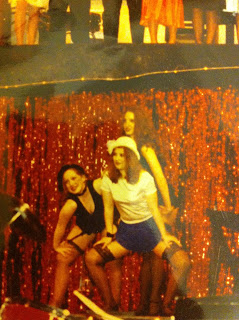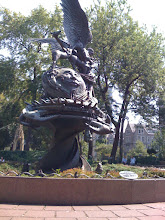Thinking about dance after not having danced for six months made me extremely happy, if tearful... I'm not yet up to the kind of dance that would have impressed Fran, but I am back on two feet and working towards it.
My memories:
I remember the first day I met you, Fran. I was stretching outside the audition room, waiting for West Side Story dance auditions to start. I was a freshman and I’d only signed up for dance and acting auditions, I think. I didn’t yet have a strong enough voice to sing for Alan. At least, that was the impression I had from my mother’s high standard. Anyway, I hadn’t set foot in Theater South yet except to see the production of Our Town (and the One Acts). I was avoiding high school drama, by avoiding drama all together - because I held a Sag and Aftra card, and how would that go over w/typical teenagers who were dreaming of life on the stage?
But despite my attempts to avoid my TS fate, I became friends w/so many cast and crew members. I thought, perhaps, I would hone my craft. I’d already decided I wanted to commit my time to cultivating friendships rather than getting rejected by the casting agents William Morris sent me to. So, finally, a friend (Greg Stemkowski) who knew about my childhood acting (from catching the Disney movie I was in that played on channel 11), convinced me to get involved. Who could refuse a face like Greg’s?
So there I was, warming up right outside of the audition room. I was wearing a black bodysuit and what would probably pass as yoga pants these days. I’d only lived in Great Neck for just over a year, and very few people knew much about my life back in California. Some girl said, “hey, you dance for real, don’t you?” I’d been taking dance classes since I was 2 1/2. “I’ve taken lessons,” I called back nonchalantly. Everyone had probably taken lessons, at least amongst the girls. That’s what moms do with their daughters, right? I had taken 3 kinds of dance, which eventually became 4, ballet, tap, jazz and ‘street funk’ — but you know all of that, Fran, because you recognized it too - immediately - and gave me a role in West Side Story that took my breath away with every high kick. There I was, a featured dancer, and I promise you, every part of my body thought that those moments on stage would become my college essay.
The rush of getting a routine perfectly right as the curtain closed on a pose impossible to hold for just one more second, that was one of the most exhilarating feelings I ever could have imagined having. I was a Shark. It didn’t matter that my pale complexion and red-hair would have told you otherwise. A lesson in bronzer ensued. And my expertise in eyeliner did not go to waste. In fact, it became my reputation so much so that I’d often do make-up for the guys in shows for the coming years. How I loved having that skill, and so what if it came from professional make-up artists, very few people would ever know that.
 | |
| On stage without wardrobe malfunctions. |
So back to where I started, the first day dancing with you became many days, and to my good fortune, even when my priorities changed in high school, and I started observing shabbat my junior year, you found me in the halls and asked, “Sheridan, why didn’t you audition for the musical this year?” And I explained to you that I couldn’t imagine getting approval not to perform on a Friday night. “What?!” You said, aghast! “I would have built choreography for that! Of course I would. To not have you on stage is a real loss.” I couldn’t believe my ears, Fran. And thanks to that conversation, I did Music Man in my senior year. And while I couldn’t accept the singing solo Alan Schwartz offered because I’d be out Friday night, I could dance my heart out because you knew how to make that happen. Your choreography was a blessing, even when it was difficult. Even when we had to go over it again. It would always elicit a smile from yours truly.
You are truly one of the reasons I am able to look back fondly at Great Neck South. For its uniqueness, its understanding, its ability to meet my needs as a student, learner and active participant in the community. I went on to get to BAs - one in English and one in Modern Jewish Studies (from Columbia and the Jewish Theological Seminary) and from there, my Master’s in Education, focusing in informal and communal Jewish education, also at JTS. I worked with teenagers for the first three years after graduate school - first creating educational material for youth groups and then at the Sid Jacobson JCC, where I was encouraged many times to get involved in their musical. Then, I started working at my alma mater - Columbia University. Nearly five years later, I’m still here, serving as the Assistant Director of the Institute for Israel and Jewish Studies. I sometimes joke with my colleagues and the PhD students and faculty whom I oversee that my public high school was a lot like a yeshiva. I learned the book of Job, I took Hebrew, I was able to comfortably observe shabbat … remarkable, really. You were part of that experience, and I’m so grateful to say that’s so. While in college, I had the opportunity to see Cabaret on Broadway with Alan Cumming as the Emcee - it was extraordinary, to sit at the small tables so close to the performers and smile so big to keep myself from belting out the songs with the cast. From the obscene to the absurd and back again, or as they say in Cabaret; “every night we have the battle to keep the girls from taking off all of their clothing. So don’t go away, who knows? Tonight we may lose the battle!” Well, I wish you well with every battle you face, a complete healing as we say in hebrew, a refuah sheleima. Thank you for always being an inspiration in your dedication, understanding and commitment to excellence.
Love always, Sheridan Gayer GNSHS ’95-’99
P.S. I write this just days after having a very involved surgery to correct something that went wrong when I broke my leg in January. I have run a tour in Israel on crutches since then, but I have hobbled around with a cane since. Right now I’m in a cast for the second time in six months, and for the next two weeks I’m not to do anything but keep my leg elevated and use crutches when I go to the bathroom or get up for water. The less often I’m up, the happier the doctors are. That’s a long way of saying I haven’t walked normally in almost six months, and it has been a privilege to recall my days on stage with you during my own recovery.

